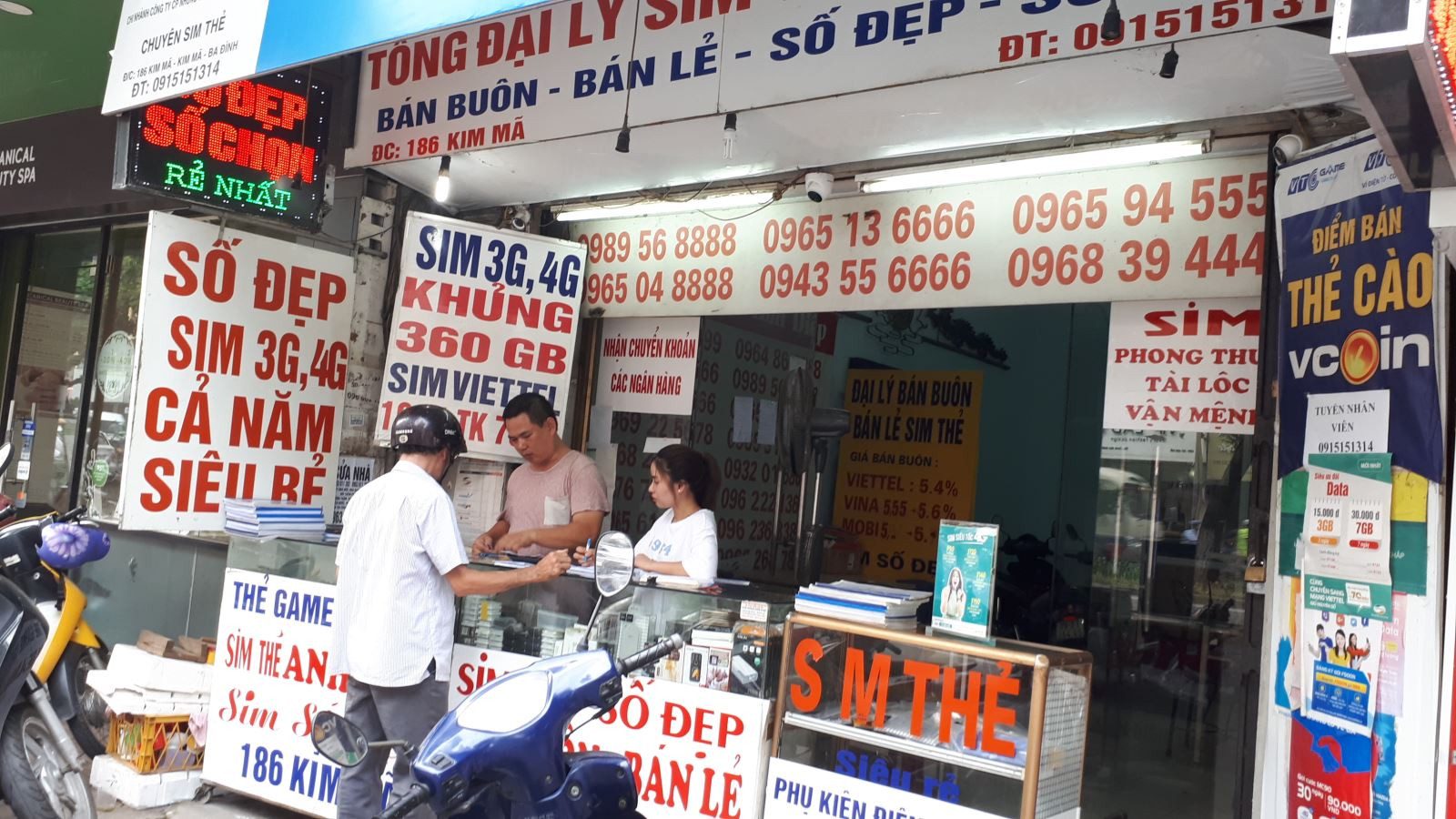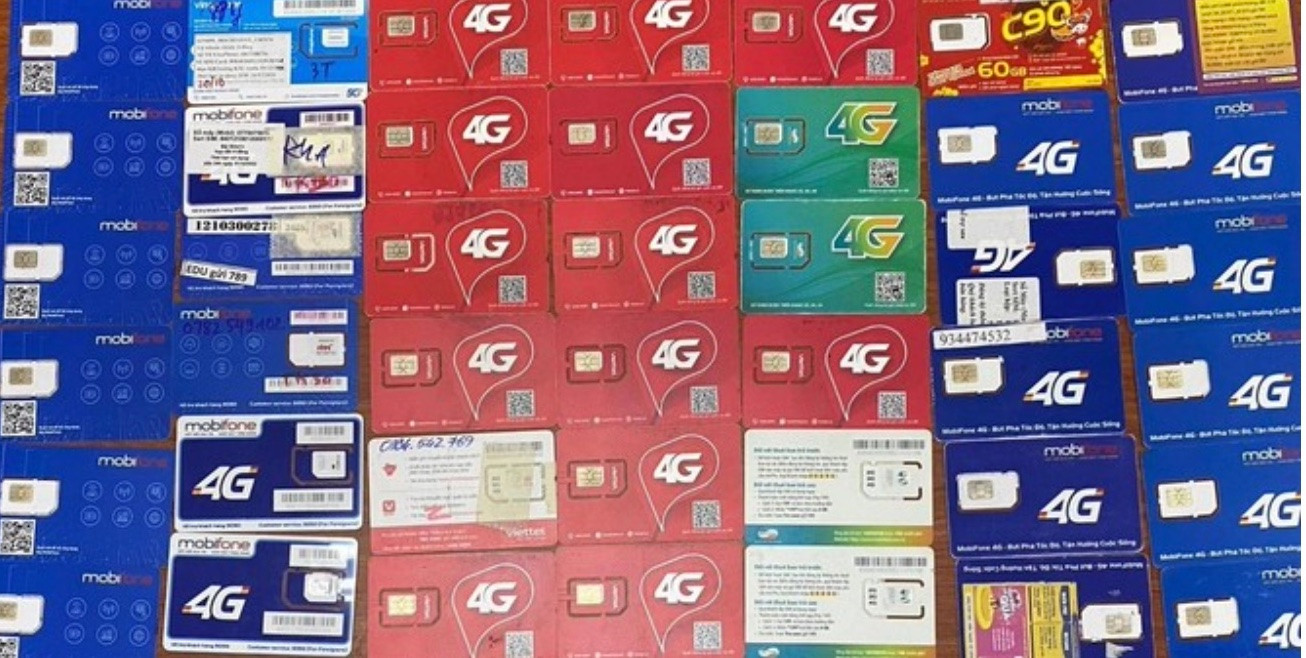The Department of Telecommunications recorded that from March 1 to March 31, 2024, on average, 1 person owned 4-9 phone SIMs, equivalent to 7.9 million registered SIMs.

Worryingly, many people own multiple SIM cards but do not have their names on them. This also means that there are still many junk SIM cards circulating but not being thoroughly managed by network operators.
Junk SIMs are still rampant
Over the past month, the Ministry of Information and Communications (MIC) has developed a tool to help users check how many SIMs they own. Specifically, users text to check subscriber information via the number 1414 with the syntax TTTB along with their citizen identification number. Thanks to that, many people have discovered that they have strange SIMs that they do not own. This has helped the MIC take strong measures to handle junk SIMs.
In the past month alone, about 1,200 subscribers have reported to telecommunications companies, questioning the strange SIM numbers they own. Based on that, the network operators have removed the subscriber numbers from the list that customers reported, and carried out one-way and two-way blocking procedures for subscribers with incorrect names and documents. According to the Telecommunications Department, about 200 subscriber numbers have been blocked. This shows that the network operators have actively participated in the process of standardizing subscriber information.
However, in reality, phone calls, text messages inviting people to apply for credit cards, win prizes at electronics stores, or fraudulent calls impersonating officials from departments, agencies, etc. have not decreased significantly; many people even use junk SIMs to lend money at high interest rates, collect debts, etc., making many people feel "powerless" in the face of these annoying calls.
In response to this issue, the Ministry of Information and Communications has requested that from April 15, mobile telecommunications enterprises must take full responsibility if new SIMs that are not in compliance with regulations appear on the market. In case of detecting violations (such as SIMs with subscriber information), the Ministry will organize inspections to strictly handle violations (including reviewing and stopping new development), and will consider issuing written reminders to the heads of enterprises and report to the Prime Minister for consideration of disciplinary action.
Regarding the problem of spam calls, spam messages attacking and defrauding users, according to the Ministry of Information and Communications, to maximally prevent the spread of spam calls on cyberspace, it is necessary for relevant agencies, organizations and the people themselves to proactively take action. In particular, urging mobile businesses to handle SIMs with incorrect subscriber information (spam SIMs) and standardizing subscriber information is one of the measures to prevent methods that scammers can use. In addition, the Ministry will direct the strengthening of the use of identified calls and identified messages (Voice brandname); handling websites with signs of fraud, etc.
In addition, Decree 91/2020/ND-CP clearly stipulates that advertising calls must use an identifier. Therefore, securities, real estate, insurance companies, etc. need to register and use the Voice Brandname service to make advertising calls when needed, instead of hiring subjects to use telephone advertising services that are not in accordance with regulations.
Not to mention, from July 1, 2024, the State Bank has required bank money transfer transactions (to different account holders) or deposits into e-wallets of over 10 million VND; or the total value of money transfer and payment transactions in a day exceeding 20 million VND must be authenticated by biometrics to help minimize fraud in cyberspace...
Recommendation to look up mobile subscribers to prevent fraud
Although the Ministry of Information and Communications has many synchronous measures to manage junk SIMs in the coming time, including sending text messages to respond to fraudulent and harassing phone numbers. However, the Department of Information and Communications of Ho Chi Minh City said that it takes 15-20 days to receive feedback on information about SIM fraud cases. Therefore, the Department of Information and Communications of Ho Chi Minh City has just sent a document to the People's Committee of Ho Chi Minh City to request the Ministry of Information and Communications to manage and resolve the situation of subjects using unregistered phones and junk SIMs to evade responsibility when discovered and handled by the investigation agency.

According to the petition of the Department of Information and Communications of Ho Chi Minh City, cases related to fraud and property appropriation on cyberspace and via telephone subscribers are becoming extremely complicated and tend to increase with new, sophisticated, unpredictable methods and tricks, causing many difficulties for authorities in detecting, investigating and handling violations.
Meanwhile, when receiving reports, denunciations, and complaints from individuals or organizations related to the use of foreign SIM cards or social network accounts for fraud, harassment, and other violations of the law, state management agencies and investigation agencies have not been able to proactively update and verify information of the subjects committing the above-mentioned violations.
Instead, these agencies must send documents to the agencies of the Ministry of Information and Communications and telecommunications enterprises to request information or coordinate handling according to regulations. Therefore, on average, it takes 15-20 days for the above agencies to receive feedback. This affects the progress of handling violations, especially in many cases of violations by foreign social network accounts that are not handled promptly or do not remove the violating information.
Based on the above practical situation, the Department of Information and Communications hopes that the Ministry of Information and Communications will coordinate with the Ministry of Public Security to consider issuing a coordination process regulating the method and time for verifying and providing subscriber information between telecommunications enterprises and state management agencies and police investigation agencies at the central and local levels; and direct telecommunications network operators to urgently connect and share mobile subscriber user data with citizen data.
In addition, the Department also requested the Department of Telecommunications to share and provide accounts allowing the Department to look up mobile subscriber information of users in the City to serve the management, fight against and handle violations; at the same time, recommended the Ministry of Information and Communications to direct the Vietnam Internet Center to provide accounts and allow the Department of Information and Communications of Ho Chi Minh City to look up data information on the subjects registering, using and managing ".vn" domain names and international domain names that have notified their activities to the Ministry of Information and Communications to serve the management, fight against and handle violations.
At the same time, the City Department of Information and Communications wishes to share and provide a list of contact information and have a written authorization for the Department to work directly with service providers and cross-border platforms to handle content belonging to Ho Chi Minh City.